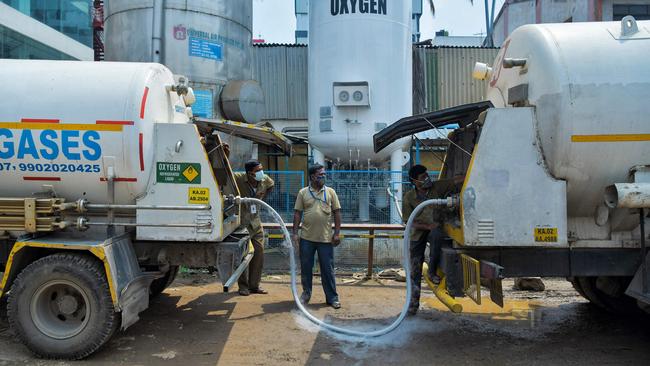Joe Biden backs plan to waive Covid-19 vaccine patents
The US president has been under intense pressure amid criticism that rich nations were hoarding shots.

US President Joe Biden’s administration on Thursday announced support for a global waiver on patent protections for COVID-19 vaccines, offering hope to poor nations that have struggled to access the lifesaving doses.
India, where the death toll hit a new daily record amid fears the peak is still to come, has been leading the fight within the World Trade Organisation to allow more drugmakers to manufacture the vaccines — a move that pharma giants oppose.
US Trade Representative Katherine Tai said while intellectual property rights for businesses were important, Washington “supports the waiver of those protections for COVID-19 vaccines” to end the pandemic. “This is a global health crisis, and the extraordinary circumstances of the COVID-19 pandemic call for extraordinary measures,” she said.
Mr Biden had been under intense pressure to waive protections for vaccine manufacturers, especially amid criticism that rich nations were hoarding shots.
WHO director-general Tedros Adhanom Ghebreyesus called the US decision “historic” and said it marked “a monumental moment in the fight against COVID-19”.
Ms Tai cautioned however that negotiations “will take time given the consensus-based nature” of the WTO. With supplies for Americans secured, the Biden administration will continue efforts “to expand vaccine manufacturing and distribution,” and will work to “increase the raw materials needed to produce those vaccines,” she said.
For months the WTO has been facing calls to temporarily remove the intellectual property protections on COVID-19 vaccines, known as a TRIPS waiver in reference to the agreement on Trade-Related Aspects of Intellectual Property. But that notion has been fiercely opposed by pharmaceutical giants and their host countries, which insist the patents are not the main roadblocks to scaling up production, and warned the move could hamper innovation.
“A waiver is the simple but the wrong answer to what is a complex problem,” the Geneva-based International Federation of Pharmaceutical Manufacturers and Associations lobby group said, describing the US move as “disappointing”.
Countries such as New Zealand, however, welcomed the US announcement, while Australian Prime Minister Scott Morrison called the move “tremendous news,” adding that it would help his country manufacture mRNA vaccines locally. France, on the other hand, opposes the waiver, saying it prefers instead a donation-based model to help poor countries overcome a lack of vaccines.
India on Thursday reported 3980 new deaths, taking the national total to 230,168, and 412,262 new cases, bringing India’s caseload to 21.1 million. The renewed rise follows several days of falling case numbers that had raised government hopes that the surge may have been easing. The sharp rise in cases since late March has overwhelmed hospitals in many places with fatal shortages of beds, drugs and oxygen.
Having hit a high of 402,000 last Friday, the daily number of cases eased in subsequent days to as low as 357,000 before creeping up again on Tuesday. The sharp rise in cases since late March has overwhelmed hospitals in many places with fatal shortages of beds, drugs and oxygen.
Prime Minister Narendra Modi’s government has resisted imposing a new lockdown although several regions including the capital New Delhi, Bihar and Maharashtra have imposed local shutdowns. In an effort to boost the country’s collapsing health system, India’s reserve bank announced $US6.7bn ($8.7bn) in cheap financing for vaccine makers, hospitals and health firms. India’s crisis has been partly fuelled by a lack of vaccines. This has in turn exacerbated the global shortage as India is the world’s biggest producer of COVID shots.
AFP



To join the conversation, please log in. Don't have an account? Register
Join the conversation, you are commenting as Logout